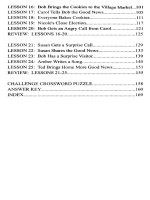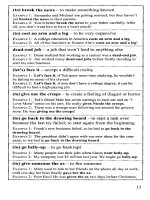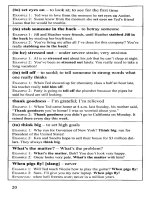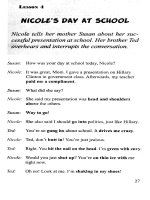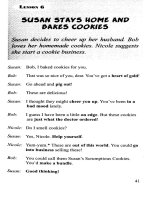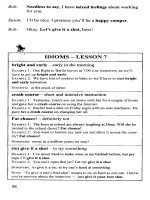Speak english fluently
Bạn đang xem bản rút gọn của tài liệu. Xem và tải ngay bản đầy đủ của tài liệu tại đây (1.01 MB, 240 trang )
UPKAR’S
By : Dr. Mahendra Saraswat
UPKAR PRAKASHAN, AGRA-2
By the Same Author
* lœ`¥rk ds` vnΩHqr jgL;
* bE^wo ;ksj ekbUM ikoj
* ^sj.kæfDr ds` peRd`kj
* nΩ xVΩl
* beksæu¥ gSYFk
* n ikoj vkWœ` eksfVosæu
* Create Super Intelligence
* The World of Inspiring Quotations
* The World of Idioms And Phrases
* The World of Synonyms And Antonyms
* The World of Proverbs
© Publishers & Author
Publishers
UPKAR PRAKASHAN
2/11A, Swadeshi Bima Nagar, AGRA–282 002
Phone : 2530966, 2531101, 2602653, 2602930; Fax : (0562) 2531940
E-mail :
Website : www.upkarprakashan.com
Branch Office
4840/24, Govind Lane, Ansari Road,
Daryaganj, New Delhi–110 002
Phone : 23251844, 23251866
•
•
•
This book or any part thereof may not be reproduced in any form by
Photographic, Mechanical, or any other method, for any use, without
written permission from the Publishers.
The publishers have taken all possible precautions in publishing the
book, yet if any mistake has crept in, the publishers shall not be
responsible for the same.
Only Agra shall be the jurisdiction for any legal dispute.
Price : Rs. 70·00
(Rs. Seventy Only)
Code No. 456
Printed at : UPKAR PRAKASHAN (Printing Unit) Bye-pass, AGRA
Contents
Sl.No.
01. Acquire the Power of Pronunciation Skill
Page No.
2–11
02. Let Yourself Grasp the Pompous Shortened Forms
12–19
03. Bank Upon the Proficient Vocabulary
20–45
04. Train Your Tongue
46–61
05. Befriend with Speech Fluency Techniques
62–76
06. Let Down Your Fluency Obstacles
77–91
07. Divide and Rule Your Speech
92–96
08. Realize the Beauty of Pauses
97–112
09. Speak in Rhythmic Fluency
113–123
10. Control Your Speech Delivery
124–136
11. Tag Your Speech with Short Responses
137–157
12. Secret of Successful Spontaneous Speech
158–182
13. Beautify Your Speech with Drops
183–191
14. The Final Touch
192–234
Realize the Power of Speech Fluency
English, the powerful International language, still
rules the major minds of cosmopolitan Indians. Everywhere, whether it’s an institution or an industry, people
who speak English better are treated above par than
those who are not able to speak it fluently. And fluency
of speech gives a magnetic character to its speaker and it
influences positively the person to whom you speak.
Though you read English better, write English better
and even you are able to manage to speak English, yet
sometimes, you feel that your English utterance doesn’t
leave any impression on your counterpart. It means that
your vast knowledge of English isn’t helping you to get
the required results and it lacks something. And your
adequate knowledge of reading and writing English is
facing the difficulty to move, that can put you in
dilemma when you have to see a daemonic dignitary, you
have to face an implex interview, and you have to
represent a vivid view, then you find that your treasure
of English doesn’t wish to assist you.
This is the meek point where you are compelled to
think why your English speech is so lame. This is high
time to realize the power of speech fluency. In absence of
speech fluency, English utterance looks like mockery. It
is the speech fluency that bestow the gift of successful
attempts. It makes you successful in your presentation
or discourse. It makes you successful in your interview
for an important assignment. And at the helm, it
brightens up your career.
Fluency is the soul of any language, so of English.
Fluency transforms your personality as a charismatic
and magnetic one. Fluency is the great booster of your
self-confidence.
It is the speech fluency that places you as an
important person in others’ views. They judge you by
your fluency of speech than by your treasure of qualifications. Even speech fluency is so potent that it can
establish you prominently in your society, in your
( vii )
profession, and in your enterprise. Fluency gives an
extra edge to your charming personality.
During an interview session for Maths Teacher,
merely a second class PCM graduate was selected, while
the first class post-graduate with 92·7% marks was
rejected. Do you know the reason behind the successful
selection ? It was the Fluency of Speech.
That was the prompt that drove me to inscribe some
hints and tips to young fellows striving hard for English
speech fluency. And the result is in your hands.
Believe that you are born to achieve high degree of
speech fluency. The only requirement is that you go
through each page of this book carefully, attentively,
religiously and patiently, and follow every command
honestly. And you’ll find that your ENGLISH SPEECH is
getting golden wings of FLUENCY with ease.
With all my best wishes,
—Dr. Mahendra Saraswat
Speak English
Fluently
1
Acquire the Power of
Pronunciation Skill
Do you know which tongue is mostly understood by
the world ? Yes, you are correct. It is English. Though
we have fourteen languages officially recognised in the
Indian Constitution, English still enjoys the privilege of
high goodwill in this continent. It is the only language
that is spoken far and wide in India and accepted as a
universal ambassador in every nook and corner not only
here but throughout the world.
It’s a matter of pleasure that English can be found on
language menu in every part of the country, and
proudly boasts of an important curricular subject. Most
of Indians study English since their childhood and are
able to read, write and speak. In spite of that there is
something wrong that debars so many people to manage
properly the spoken part of English. This misdemeanour
has a definite reason and the reason is that
We’ve Learnt English in an Erroneous Way
Every language has two major aspects, i.e., the
Spoken part, and the Written part. Now you recall, when
you appeared in the world, what did you do
first––Speaking or Writing. Yes, it was speech. You had
spoken first. You spoke your unknown language, and
you kept yourself in speech. It was the writing that came
after about 500 days. Certainly, it was the spoken part
of language which came first and then the written part.
This is the root cause that creates difficulties to
speak English fluently and properly. Because we fail to
adopt the natural way of speech. What do we do
generally ? We try to speak in written way of English.
While the natural way of learning is to speak first, then
write. Have you ever thought why you are most competent to speak your mother tongue fluently ? Because you
S. E. F.
|
3
learnt that to speak first and you also succeeded to
manage efficiently the written part of your mother tongue.
What we have done in the case of English ? We have
learnt to write English first in our homes, in our schools,
and in our tutorials. That’s why we always endeavour to
speak in the written style. So we fail to succeed in
gaining the speech fluency in English. It is the spoken
part of language that comes first, and the written part of
language comes later on. And this is the only natural
way to gain speech fluency.
Speak in Natural Way
Natural way of speech is the prime requirement for
development of fluency. What is the natural way of
speech ? Just imagine that you are a little kid now. If you
need anything from your mummy, what would you say ?
You would ask : “giveittome”. Would you think to learn
these words ‘give’, ‘it’, ‘to’ and ‘me’ separately and connect
them. These separate four words ‘give’, ‘it’, ‘to’ and ‘me’
would be the same as the single word ‘giveittome’ for you.
Things to Remember
1.
2.
3.
4.
The characteristics of following consonants :
G always remains silent if followed by ‘N’. For
example, Gnat (nat), Gnaw (no), Gnocchi (noke),
Gnosis (nosis) etc.
K always remains silent if followed by ‘N’. For
example, Knack (nak), Knight (nit), Know (no),
Knuckle (nukl) etc.
P always remains silent if followed by ‘S’ or ‘T’. For
example, Psalm (sam), Psycho (siko), Ptomaine
(tomain), ptosis (tosis) etc.
Q always followed by ‘U’ (except Q–boat, the war-ship
also used as merchantship), and gives the sound of
k w . For example, Quality (kwoliti), Quantum
(kwont m) , Queen (kwen), Quote (kwot) etc.
W followed by ‘r’ loses its sound. For example, Wrangler (ranglr), Wreath (reth), Wring (ring), write (rit)
etc.
e
5.
4
|
S. E. F.
And you would speak these four words in a single
utterance without any pause in between them. Thus, in
a natural speech, the group of words is uttered as a
single word–unit. In fact, natural talk comes out from
the mouth in a group of words. While we try to speak
word by word instead of group of words. Though
sometimes our speech may be limited to even a single
word too. Then what is the idea behind the natural talk.
Natural talk consists of Idea Units. You can define an
idea-unit as a ‘Group of Words’ that has a ‘meaningful
utterance’.
A natural speaker speaks in idea-units. When a child
conceive an idea in its mind it comes out from its mouth
naturally and spontaneously. Child doesn’t make any
conscious effort to edit the words to be uttered.
Speak in Idea Units Only
This is your first instrument to acquire speech
fluency. Idea Units are your key to make you fluent.
Therefore, always try to speak in idea-units only.
Connecting two or more words together and utterance
thereof like a single word makes the real sense, and
bestow you pleasant fluency. Henceforth, speak in word–
groups, not word by word.
Though you are insisted upon here to speak in word–
groups, but in exceptional cases, you may convey your
message even in a single word, and in that case that
single word will form an idea-unit too. For example, take
the word ‘No’. Does it convey any idea ? No. Suppose
your brother spontaneously says ‘No’. Is it making any
sense to you ? No. So, it cannot be called an idea-unit.
But this single word can be converted to an idea-unit if
it is said in the right context. If you ask your brother,
‘Are you going to see the Taj Mahal ?’ and he replies ‘No’.
In this context ‘no’ forms an idea–unit. Therefore, ‘no’ is
a contextual idea-unit here. So the utterances may be of
two types, i.e., idea-units those do not require any
support from context, e.g., descriptive utterances, like ‘I
shall go (Aishelgo)’, ‘Give it to me (givitumee)’ etc., and
idea–units those require a context, e.g., interrogative
utterances, i.e., utterances begin with question-words
like What, When, Who, Where, Why, How etc.
S. E. F.
|
5
Therefore, when you say ‘no’ only, it makes no sense.
Definitely, it requires a context otherwise it can’t give
you any meaning.
Hence, English Language consists of two distinctive
aspects :
(1) Spoken part of English, i.e., Idea Units; and
(2) Written part of English, i.e., Sentences.
An idea–unit is not like a sentence. It is the idea-unit
that matters highly in speech fluency. So you must have
clear understanding about an idea–unit that it is not
similar to a sentence. The sentences are primarily for
written part of English.
For example, look at the following sentence :
‘It is the message that was conveyed by your mother
to buy some sweets because your papa has asked for.’
Is it an idea-unit ? Definitely not. Because it contains
so many ideas like (a) It is the message, (b) that was
conveyed by your mother, (c) to buy some sweets, and
(d) because your papa has asked for. It is the complex
mixture of four different sentences. These sentences are
meant for literature or written part of English, not for
spoken part, and do not represent the natural talk.
In natural talk, there is no need to mix up so many
ideas. Speak in simple idea-units, in simple word-groups,
in simple utterances. It is the simple idea-unit that is easy
to say, and easy to understand. Thus, you can convert
the written part of English in simple idea-units like ‘It’s
the message’ ; ‘your mummy has asked to buy some
sweets’; ‘for your papa’ in place of ‘It is the message that
was conveyed by your mother to buy some sweets
because your papa has asked for’. Therefore, your speech
should be in accordance with contextual idea-units which
can be a ‘group of words’ or merely a ‘single word’.
Leave Sentences for Written English
Sentences are not the essential part of natural talk or
spoken part of English. Sentences are the part of written
English. Practically, we try to speak in sentences, i.e.,
written part of English, because we have learnt writing
first, not to speak. That’s why we have acquired the in–
feed instinct to speak in the way we write.
6
|
S. E. F.
Hence, it is your pre-requisite to avoid speaking in
sentences of written part of English. And start speaking
in idea-units only. It is the Golden Key to gain Speech
Fluency.
Now you may ask ‘How can I speak in idea–units,
because I have the habit of forming sentences ?’ Yes,
this is the real problem with you. But there is also a
foolproof solution to this problem. And the right and
ultimate solution of this problem is
Train Your Speech Organs
You are in possession of very unique speech organs
gifted by the Omnipotent. These organs have been
equipped with extra-ordinary capabilities to provide you
wonderful speech fluency, if you give them required
training. These speech organs are your tongue, your
lips, your throat, and some other parts of your mouth,
and need some special treatment and training.
Till now, these organs of speech have learnt certain
type of habits and so also have gained fluency in our
mother tongue, that is different from English. It is the
secret behind its appreciable fluency, and our speech
organs are very efficient to produce idea–units in our
mother tongue, because we started speaking it first and
writing next.
To speak English fluently, the training of speech
organs is an indispensable process, that programme
your mind to grasp the habits of English speech. It is
the training of speech organs that assist you in framing
the proper idea–units. And the training programme for
your speech organs consists of a very easy single
lesson. That is
Read the Practice Material ALOUD
Yes, this is the only and single method that would
compel your speech organs to make you fluent in
English speech. So ensure reading your practice material
ALOUD as well as several time. Remember, it is very
necessary to gain fluency. That’s why make it a point
and etch in your mind to read the practice material
ALOUD, ALOUD and ALOUD only.
S. E. F.
|
7
Understand the English Alphabet Properly
You have studied the English alphabet for the sake of
written English. Now you must realise the beauty of the
powerful sound of alphabet, and be acquainted to them.
The alphabet have their distinctive sounds and require
better understanding in right perspective. So understand
the alphabet, recognise their correct pronunciation
(sound), read the examples and pronounce them aloud.
Before going through the pronunciation chart, you
are required to acquaint with some unique notations. In
the pronunciation chart, you will find some strange notations like ‘ ’ or ‘ : ’. ‘ ’ is a semi–vowel sound frequently
used in English. This semi-vowel sounds like a semi–‘a’
or a semi–‘e’ or a semi–‘o’ sound. To know how ‘ ’ sounds
like, clench your teeth, stretch the lips sideways towards
the cheek, but don’t round your lips. And say ‘a’. You
have not to say letter ‘a’, but sound ‘a’. This sound comes
from your throat. It is the sound of semi-vowel ‘ ’. It is a
very short sound. ‘ : ’ is the long form of ‘ ’, but its length
is also very short in comparison to length of other vowels.
Now let’s forward towards the pronunciation chart.
e
e
e
e
e
e
e
PRONUNCIATION CHART
Alphabet
Examples
Pronunciations
Vowels
bat, glad, has, sad
a
a
air, raid, same, tame
heart,
bat, glad, haz, sad
ar, rad, sam, tam
a
glass,
psalm
mass, glas, hart, mas, sam
e
den, eld, mend, red
e
chief, clean, seize, team chef, klen, sez, tem
i
busy, chin, hymn, tin
bizi, chin, him, tin
i
o
might, side, shy, write
cot, lot, mop, shop
mit, sid, shi, rit
kot, lot, mop, shop
o
dough, low, toe, tone
do, lo, to, ton
den, eld, mend, red
8
|
S. E. F.
Alphabet
Examples
Pronunciations
o
brought, caught, fall, brot, kot, fol, lon
lawn
u
cup, flood, love, rub
kup, flud, luv, rub
u
dew, huge, news, view
du, huj, nuz, vu
u
bury, fern, learn, world buri, furn, lurn, wurld
Diphthongs
oo
cool, moon, who, zoo
kool, moon, hoo, zoo
oo
could, good, took, wood kood, good, t o o k ,
wood
oi
boil, buoy, foil, toy
boil, boi, foil, toi
ow
brown, down, fount, brown, down, fownt,
sound
sownd
Consonants
b
box, bun, rob, tub
c
see box
boks, bun, rob, tub
ch
Dutch, fetch, match, duch, fech, m a c h ,
such
such
d
den, do, duck, lad
dh
radh r,
mother, rather, the, then mudh r ,
dh , dhen
den, doo, duk, lad
e
e
e
f
fair, laugh, roof, tough
g
see box
far, laf, roof, tuf
gh
Ghana, ghat, ghee, ghost ghana, ghat, ghe,
ghost
gz
exact, exalt, examine, igzakt, igzolt, igzamin,
example
igzampl
h
havoc, hill, hymn, oho
e
(h)w
hav k , hil, him, oho
whale, wheel, wheen, whal, whel, when,
which
which
S. E. F.
Alphabet
Examples
|
Pronunciations
j
gentle, gym, jump, ledge jentl, jim, jump, lej
k
calf, cap, king, kiss
kaf, kap, king, kis
ks
fax, ksar, Lux, tax
faks, ksar, luks, taks
kw
quality, queen, quiet, kwaliti, kwen, kwit,
quip
kwip
l
lad, luck, milk, tall
lad, luk, milk, tol
m
dome, mill, ram, tame
dom, mil, ram, tam
n
man, nil, note, ten
man, nil, not, ten
ng
long, ring, song, tongue long, ring, song, tung
p
lips, nip, park, pen
lips, nip, park, pen
r
rib, rice, risk, wrought
rib, ric, risk, rot
s
mass, psalm, scene, sip mas, sam, sen, sip
sh
t
9
rush, ship, shoe, shy
rush, ship, shoo, shi
date, fit, task, tips
dat, fit, task, tips
th
hath, path, think, thumb hath, path, think,
thumb
v
scurvy, valet, value, skurvi, valit, valu,
vesta
vesta
w
one, swing, watch, were wun, swing, woch,
wur
y
bastion, higher, yak, basy n hiy r , yak,
yot
yatch
z
lodge, Ozone, was, zone
zh
azure, lesion, measure, azhur, lezh n, mezh r,
zho
zho
e
e
loz, ozon, woz, zon
e
e
10
|
S. E. F.
Be Acquaint to the Power of ‘C’ & ‘G’
Barring exceptions, “C” and “G” have distinctive edge
over other Consonants and possess the property of two
different sounds.
When “C” and “G” are followed by a, o, u, l or r, these
consonants enjoy the sounds of ‘K’ and ‘G’ respectively.
For example C→ Cat (kat), Cot (k..
ot), Cup (kup), Class
(klas) and Crane (kran); and G→ Gas (gas), Goat (got), Gum
(gum), Glaze (glaz) and Grass (gras).
On the other hand, if “C” and “G” are followed by e, i or y,
these consonants produce the sounds of ‘S’ and ‘J’
respectively.
For example C→ Cess (ses), Cigar (sigar) and Cycle (sikl);
and G→ Gem (jem), Gin (jin) and Gym (jim).
Manage for the Necessary Tool
When you start any execution or operation, what do
you do ? Yes, you make some arrangements for
necessary implements or tools. So here is also the need
to manage for the required tool to get fluency in English.
It will prove a good help to achieve your desired aim.
And this tool is a good ‘English to English’ or ‘English to
Hindi’ or your language Dictionary. You need it at every
stage to have a clear idea about any new word,
its meaning and its pronunciation. A dictionary is a
right source of various kinds of information related to
words.
In this book, I have used some notations like a, a, e,
—
oo, etc. These are the recognised notations of English
language as suggested in Chambers 20th Century
Dictionary published by Allied Publishers Pvt. Ltd., New
Delhi. This is one of the best Dictionaries available. You
can make good use of it too.
S. E. F.
|
Chapter in Nutshell
•
•
•
•
•
Always remember that the practice material should
be read ALOUD and that too again and again to train
your Tongue, your Lips, your Throat and other organs
of speech.
It is the Spoken language that comes first, and
Written language only afterwards.
The Spoken part of language is not the same as the
Written part. Don’t try to speak in written style of
language.
Speak in a Natural Way, i.e., to speak in Word-groups.
Learning and speaking in words only can’t help you
to gain speech fluency. UTTER each word-group as a
single word-unit or you can say in a single IDEA
UNIT. Natural talk comes out in idea–units only, i.e.,
the group of words.
You are not required to consciously stop to think
about how to string the words together. Speak out
spontaneously.
11
2
Let Yourself Grasp the Pompous
Shortened Forms
Have you ever seen the barriers ? The barriers are
meant to block the traffic on roads/rails etc. But there
is an invisible damn barrier between you and your speech
fluency. Can you trace or sort it out ? No. Don’t worry.
Here is that. And it is the Fear of making Grammatical
Mistakes. Yes, it is one of the greatest barriers that
hurdle your speech fluency. Resultantly, you feel
hesitation to speak English effectively. Your fear of the
feeling that what the listener will think of you for your
ignorance about English, and its grammatical mistakes.
It poses really a problem before you. But as you
know, every dark cloud possesses a silver lining, so
every problem brings its solution with it. The right
solution of this problem is the use of SHORTENED
FORMS of speech starters or initiators. The given list of
Shortened Forms of starters is bound to give you an
extra confidence. Because the list consists of single
word for almost Subject plus Auxiliary Verbs those
require single utterance consequently.
In this list, you will find that there are a number of
word-groups which have the same utterance for different
spellings of word-groups. For example, ‘Heez’ for two
different word-groups, i.e., ‘He is’ and ‘He has’; and ‘Aid’
for ‘I had’ and ‘I would’. When you utter ‘Aid’, it expresses both ‘I had’ and ‘I would’, and it gives liberty to the
listener to derive the idea according to its requirement.
Now it rests with the listener to distinguish that what
may that word-group be, either ‘I had’ or ‘I would’.
Therefore, enhance your intimacy with these extraordinary idea-units, and trust that they will prove your
best friend on the path of gaining speech fluency.
S. E. F.
|
13
Henceforth, you are required to make good use of
Short Forms only of very common words given in the
Chart herebelow. Besides it, whenever you wish to give
a special impetus, then you are free to use the long
forms of the word-groups. Since gaining fluency is our
main concern here, so forget about the long forms of
word-groups. Use and keep the following Shortened
Forms in your memory.
Chart of Shortened Forms
Long Form
Shortened
Form
Pronunciatio
n
I am
I’m
a’im
I have
I’ve
a’iv
I had/I would
I’d
a’id
I shall/I will
I’ll
a’il
We are
We’re
ve’ea(r)*
We have
We’ve
ve’ev
We had/We would
We’d
ve’ed
We shall/We will
We’ll
ve’el
You are
You’re
yooa’(r)*
You have
You’ve
yoov
You had/You would
You’d
yood
You will
You’ll
yool
They are
They’re
the’a(r)*
They have
They’ve
the’iv
They had/ They would They’d
the’id
They will
They’ll
the’il
He is/He has
He’s
heez
He had/He would
He’d
heed
He will
He’ll
heel
She is/She has
She’s
sheez
She had/She would
She’d
sheed
14
|
S. E. F.
Long Form
Shortened
Form
Pronunciatio
n
She will
She’ll
sheel
It is/It has
It’s
its
It had/It would
It’d
itd
It will
It’ll
itl
That is/That has
That’s
thats
That are
That’re
that a(r)*
That have
That’ve
thatv
That had/That would
That’d
thatd
That will
That’ll
Here is
Here’s
thatl
he z
Here are
Here’re
There is/There has
There’s
hea(r)*
th z
There are
There’re
th r a(r)*
e
e
e
e
e
There have
There’ve
T h e r e h a d / T h e r e There’d
would
th v
th d
There will
There’ll
th l
How is/How has
How’s
hauz
How are
How’re
How have
How’ve
haua (r)*
hau v
e
e
e
How had/How would How’d
hau d
How will
How’ll
haul
Who is/Who has
Who’s
hooz
Who are
Who’re
hooa (r)*
Who had/Who would
Who’d
hood
Who have
Who’ve
hoov
Who will
Who’ll
hool
S. E. F.
Long Form
Short Form
|
Pronunciatio
n
What is/What has
What’s
vatz
What are
What’re
What have
What’ve
vata(r)*
vat v
e
e
What had/What would What’d
vat d
What will
What’ll
vat l
When is/When has
When’s
ven z
When are
When’re
When have
When’ve
vena (r)*
ven v
e
e
e
e
When had / When When’d
would
ven d
When will
When’ll
ven l
Where is/Where has
Where’s
vhe z
Where are
Where’re
v h ra(r)*
Where have
Where’ve
vh v
e
e
e
e
e
Where had / Where Where’d
would
vh d
Where will
Where’ll
vh l
Do you
D’you
Shall have
Shall’ve
ju–u (or d’yu)
shal v
Will have
Will’ve
vil v
Should have
Should’ve
shud v
Would have
Would’ve
vud v
Can have
Can’ve
kan v
Could have
Could’ve
kud v
May have
May’ve
mei v
Might have
Might’ve
mit v
e
e
e
e
e
e
e
e
e
—
e
Ought to have
aut v
15
|
S. E. F.
Must have
Long Form
Must’ve
Short Form
e
16
mus v
Pronunciatio
n
Is not
Isn’t
(i)zn(t)*
Are not
Aren’t
aun(t)*
Was not
Wasn’t
vazn(t)*
Were not
Weren’t
w : n(t)*
Does not
Doesn’t
duzn(t)*
Do not
Do’nt
don(t)*
Did not
Did’nt
didn(t)*
Has not
Hasn’t
hazn(t)*
Have not
Havn’t
havn(t)*
Had not
Hadn’t
hadn(t)*
Will not
Won’t
won(t)*
Would not
Wouldn’t
vudn(t)*
Shall not
Shalln’t
shan(t)*
Should not
Shouldn’t
shudn(t)*
Can not
Can’t
kan(t)*
Could not
Couldn’t
kudn(t)*
Must not
Musn’t
musn(t)*
Need not
Needn’t
needn(t)*
Might not
Mightn’t
mitn(t)*
Ought not
Oughtn’t
autn(t)*
e
* The consonants ‘r’ and ‘t’ closed in parenthesis ‘( )’ represent the letters
having very mild or half –sounds thereof. You have the liberty to even drop
these letters’ sound, while you speak. For example, you can pronounce ‘Has
S. E. F.
|
17
Practice Material
There is no need to learn the practice material by
heart, but is meant to read it ALOUD several times. This
practice benefits you in many ways, such as
(a) It gives a clear picture of patterns of general
frames of words–groups to your mind to generate more
idea–units.
(b) It forms the habit of natural speech so that your
organs of speech and mind can associate unconsciously.
(c) It helps the Central words to work in various
contexts.
The following practice material consists of selfcontained idea-units. Read each idea-unit as a single
word. For example, utter “I am afraid of cockroaches”,
as if the word–group is a single word “Iamafraidofcockroaches”, and not as if there are five different words in
it. Let ‘I’ flow into ‘am’, ‘am’ into ‘afraid’, ‘afraid’ into ‘of’’,
and ‘of ’ into ‘cockroaches’, and speak out as a single
word. Now let’s proceed for practice.
I’m late. I am not a singer. I’ve a pen. I haven’t a
coat. I’d gone there. I hadn’t written a letter. I’ll see the
picture. I won’t sing a song. I’d like to go there. I
wouldn’t have a piano. I won’t take milk. I wouldn’t
like to play. I shan’t come. I can’t say. I may’ve it. I
must’ve a piano. I don’t like classical music. I hadn’t
been there.
You’re a good boy. You aren’t a player. You’ve a lot of
money. You haven’t a single rupee. You’d read the book.
You hadn’t played the flute. You’ll come here. You won’t
rub the board. You’d come closer to me. You wouldn’t
drink it. You shouldn’t shout. You mustn’t open the can.
You should’ve read it. You can’ve it.
He’s out of the town. He isn’t in the room. He’s
returned to house. He hasn’t gone to the market. He’d
written a poem. He hadn’t spoken to them. He’ll write a
letter. He won’t learn his lesson. He’d beat the child. He
not’ as ‘Hazn’t’ as well as ‘Hazn’. Similarly, ‘They are’ can be pronounced
as ‘Thear’ or ‘Thea’ and so on.
18
|
S. E. F.
wouldn’t tease the kids. He doesn’t have any book. He
didn’t say it. He couldn’t appear for test. He will’ve
finished his task. He ought to have a pen. He wasn’t
there. He didn’t play well. He hasn’t finished his work.
She’s a good girl. She isn’t a good player. She’s a
beautiful woman. She hasn’t any good book. She’d sung
a sweet song. She hadn’t any good dress. She’ll dance in
a group. She won’t sing any song. She’d give thanks to
them. She wouldn’t receive them. She could’ve done it.
She doesn’t like ice-cream. She wasn’t in the room. She
hasn’t broken it.
It’s me. It isn’t me. It isn’t good. It isn’t mine. It’s a
coin. It hasn’t any coin. It’d interesting poems. It hadn’t
good pictures. It’ll be better. It won’t be nice. It’d be
good to listen them. It wouldn’t be better to leave it.
We’re too tired. We aren’t lazy. We’ve our books with
us. We haven’t money at all. We’d lost our box. We hadn’t
run on the grass. We’ll drink chilled water. We won’t go
to the movie. We’d like to swim in the pool. We wouldn’t
like to see movie. We weren’t playing. We don’t like it.
We haven’t gone there. We shall’ve written the letters.
We weren’t present there. We haven’t received cheques.
They’re very crazy. They aren’t foolish. They’ve their
note books. They haven’t their luggages. They’d a little
car. They hadn’t match boxes. They’ll slip in the mud.
They won’t climb on the tree. They’d write a letter. They
wouldn’t read their books. They aren’t there. They
mightn’t to fight. They would’ve returned till 12. They
might’ve given it. They aren’t painter.
That’s good. That isn’t good. That’re beautiful. That
aren’t interesting. That’s sense. That hasn’t any meaning. That’ve nothing to say. That haven’t any common
sense. That’d some logic. That hadn’t any logic. That’ll
prove a good bet. That won’t be a fair deal. That’d do
some magic. That wouldn’t be useful.
Here’s your money bag. Here isn’t your book. Here’re
some good novels. Here aren’t good flowers. Here isn’t
any plant.
There’s a nice park. There’re so many pots. There
aren’t many people. There’s been a film show. There
hasn’t been any club. There’ve been a film show.
S. E. F.
|
19
There’ve been many plays. There haven’t been a large
crowd. There’ll be an essay competition. There won’t be
any puppet show. There’d be my singing. There wouldn’t
be my play.
How’s your mother ? How’re your brothers ? How’s
she slipped on floor ? How’ve they reached there ?
How’d he attend the party ? How’ll you send the money ?
What’s your name ? What’re your qualifications ?
What’s driven you here ? What’ve you missed in the
park ? What’d she lost ? What’ll be there ? What’ll
happen after it ? What’d be the price of that ? What
d’you do ?
Where’s my watch ? Where’re your books ? Where’s
she gone ? Where’ve they played ? Where’ll you be ?
Where’d be the next show ?
Who’s incharge here ? Who’re the players ? Who’s
broken it ? Who’ve won the match ? Who’ll bat first ?
Who’d be the captain ?
When’s the next train ? When’re her sisters coming ?
When’s the course finished ? When’ve the ministers
visited ? When’ll you come ? When’d she appear for the
interview ?
Needn’t to go.
Chapter in Nutshell
•
•
To avoid the Fear of Grammatical Mistakes,
don’t try to use the Long Forms of starters at
this stage.
Ensure maximum use of Shortened Forms
like ‘I’ ll’ (Ail) for both ‘I shall’ and ‘I will’; and
‘You’d’ (Yood) for both ‘You had’ and ‘You
would’ and so on.



